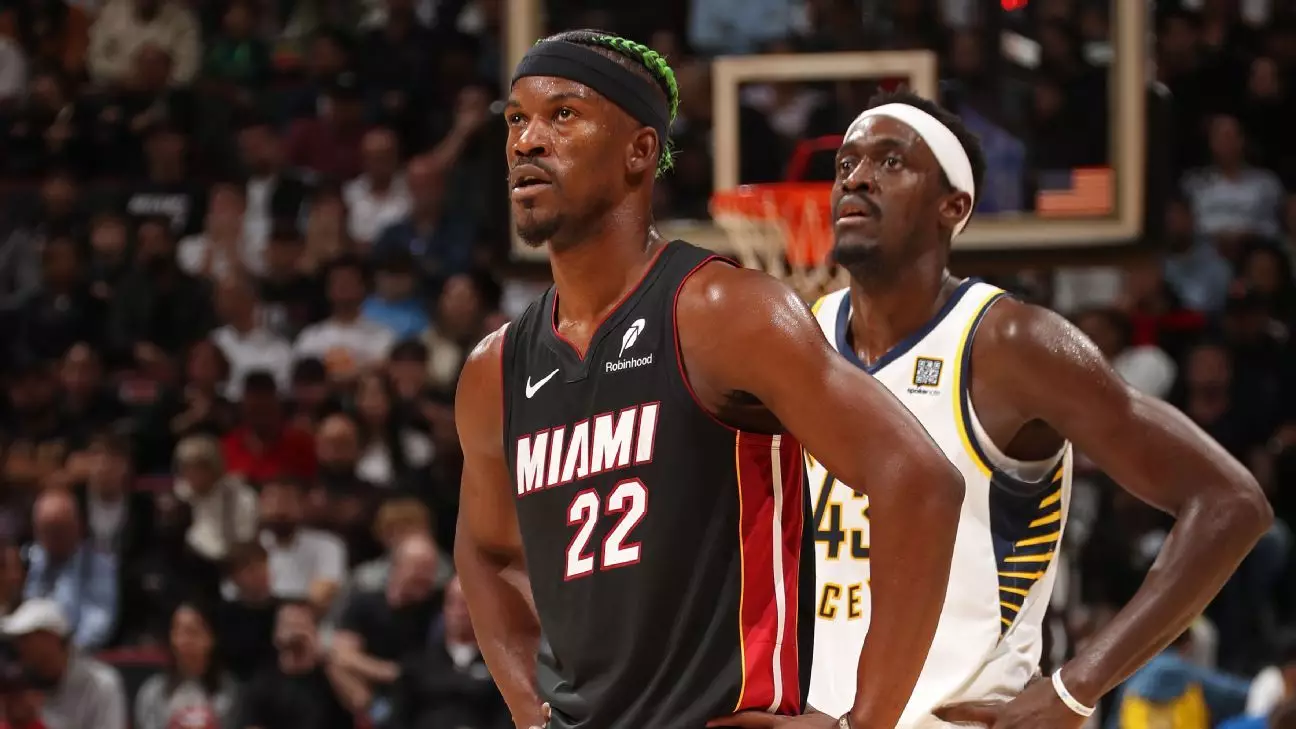The ongoing saga surrounding Jimmy Butler and the Miami Heat has taken a dramatic turn as rumors spread about Butler’s desire for a trade. This situation is not merely a matter of sports stats; it dives deep into emotional and psychological dimensions that affect both the player and the organization. Butler’s recent comments and performance indicate a growing disenchantment that could reshape the future of one of the NBA’s rising teams.
In a stunning revelation, Butler has reportedly expressed to the Miami Heat management that he wishes to be traded, sparking speculation throughout the league. Notably, Jimmy Butler has opted not to provide the team with a list of preferred destinations, demonstrating a unique willingness to explore various options. This nonchalant stance may signal his confidence in his ability to elevate any franchise he joins. However, juxtaposed with his recent performances—most alarmingly, scoring only nine points in a loss to the Indiana Pacers—it becomes abundantly clear that something deeper is troubling him.
Butler remarked after the game that he feels a significant loss of joy while playing in Miami. His desire to reclaim that joy indicates an existential crisis for a player known for his competitiveness and skill. “I want to see me getting my joy back playing basketball,” Butler lamented. This statement is not trivial; it illustrates his current mental state and raises questions about the implications for both his individual performance and team dynamics.
Adding layers to the unfolding drama is the perceived disconnect between Butler and team management, particularly concerning respect for his effort on the court. An implication made by team officials regarding his effort during a recent game appeared to strike a nerve. Butler firmly defended his competitive spirit despite a dip in his usage rate and overall shot attempts, emphasizing that he remains a relentless contributor regardless of points scored. He stated, “You won’t say I’m not out there playing hard.” This kind of assertion is crucial; it highlights the player’s dedication even when results are not manifesting on the scoreboard.
The Heat’s tactical decisions, such as Coach Erik Spoelstra not playing Butler in crucial fourth quarters, contribute to the murky waters of the Butler-Heat relationship. One cannot help but wonder if management’s approach is pushing one of their franchise cornerstones towards an ultimatum—either adapt or seek a new home.
Despite Butler’s vocal indications of wanting a trade, the Miami Heat’s management, led by President Pat Riley, has publicly stated their intention of retaining Butler. Riley has a history of making bold moves but also understands the delicate balance of maintaining team chemistry and leadership profiles. Any potential trade would need to account for not just Butler’s talent but also his leadership and the goodwill he has cultivated within the organization.
This backdrop of conflicting desires—Butler’s wish to explore new opportunities versus the team’s intention to keep him—points to a broader issue within professional sports: loyalty and expectations. The tug-of-war between player autonomy and organizational stability often leads to tension that can dismantle a team’s cohesion. As Butler nears the end of his lucrative contract and gives signals he might opt for free agency, a fracture seems inevitable unless reconciliatory measures are taken swiftly.
With Butler’s vocal concerns and declining on-court joy, the situation demands urgent attention from the Heat organization. They must engage in open dialogues and potentially recalibrate their strategies to lift Butler’s spirits while ensuring he remains an essential part of their future plans. Past grievances, like the lack of a contract extension prior to the next season, linger in the air and require resolution for both parties to find common ground.
As discussions around trade options heat up, Butler’s remarkable statistical data cannot be ignored—an impressive average of 18 points, 5.7 rebounds, and 4.7 assists reflects his potential to impact any team. However, the psychological aspect of the game can be just as vital, if not more so. The decision ahead for both Butler and the Miami Heat rests heavily on the intricate tapestry of mutual respect, understanding, and the ultimate goal of winning.
In summation, we are witnessing more than just a player’s dissatisfaction; we are witnesses to a critical moment that could define both Jimmy Butler’s legacy and the Miami Heat’s trajectory moving forward. As the situation unfolds, it serves as a poignant reminder of the complex relationship between professional athletes and the teams that seek to harness their potential. The coming weeks will be telling, as both Butler and the organization grapple with critical decisions that may change the course of their respective futures.


Leave a Reply